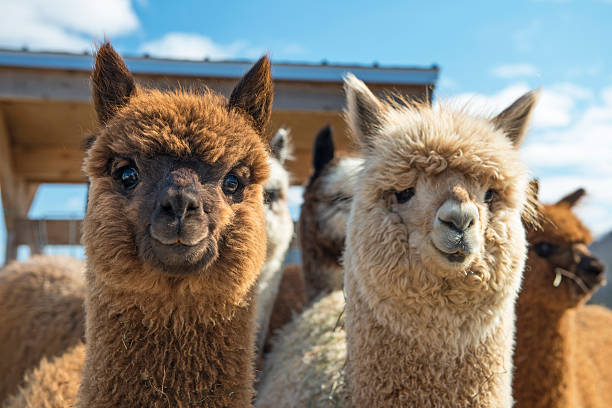Unraveling the Secrets of Alpaca Behavior: A Comprehensive Study
Introduction: Delve into the intriguing world of alpacas, as we explore their complex behavior patterns and social structures. Uncover the fascinating aspects of their day-to-day lives, from their unique communication methods to their captivating mating rituals.

The Alpaca: A Brief Overview
Originating from South America, alpacas have been domesticated for centuries, primarily for their luxurious wool. These animals are part of the camelid family, known for their hardy nature and adaptability to harsh environments. Unlike llamas, their close relatives, alpacas are smaller in stature and have a more docile temperament. They are often kept in herds and are known for their social behavior, which has intrigued scientists and animal enthusiasts alike for many years.
Breaking Down Alpaca Communication
Alpacas utilize a variety of vocalisations and body signals to communicate with each other. One of the most common sounds is the humming noise, which they use to express a range of emotions from contentment to distress. This intricate communication system plays a crucial role in maintaining the social structure within a herd and ensuring their survival in the wild.
The Mating Rituals of Alpacas
Alpaca mating rituals are a captivating phenomenon. The males, known as studs, will often engage in intense competition to win over a female. This process can involve chasing, spitting, and neck wrestling. Once a male has successfully mated with a female, he will let out a unique sound known as ‘orgling’, signifying his victory to others.
The Role of Alpacas in Modern Society
While alpacas were initially bred for their wool, they have now found a place in various other sectors. Alpaca therapy, a recent trend, leverages the calming nature of these animals to provide comfort to those dealing with mental health issues. Furthermore, their sustainable grazing habits make them an eco-friendly choice for natural lawn care.
Unleashing Alpaca Potential: Market Impact and Affordability
Alpacas are not just loved for their friendly demeanor but also for their high-quality wool. This soft and hypoallergenic material fetches a high price in the market, making alpaca farming a profitable venture. Depending on the breed and quality, an alpaca can cost anywhere between $200 to $5000.
In conclusion, understanding alpaca behavior and social structure can provide valuable insights into their needs and care requirements. With their growing popularity in various sectors, these fascinating creatures continue to captivate and intrigue us with their unique habits and characteristics.




